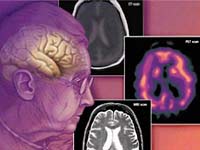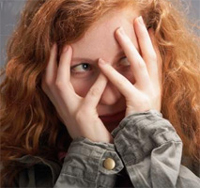What is an alarming disorder? What are the reasons for the alarming disorder in humans? How to treat disorders? Answers to these questions you will find in the article. I'm afraid because sick
Content
Associate alarm to threatening situations is definitely useful. Adequate anxiety prevents the danger of injury, pain, punishment, separation; About the threat to the situation in society, harmony in the family. It is anxiety that makes a person act - in order to avoid danger or at least level its consequences. We sit above the books all night before the exam; in a hurry, late for a business mark or on the last electric train; take a gas can. Anxiety is needed and omnipresent: the baby is worried, staying in a kindergarten without parents; teenager on the first date; Mature man reflecting about old age and death. Anxiety normally accompanies growth, changes or experiences of something new, unexplored, as well as the search for their personal role and significance in life.
But imagine that you can not explain the reason for yourself suddenly flowing fear. You cease to rule over your feelings, fear begins to manage you, rational reasoning about his groundlessness and necessity «own» powerless...
Symptom of pathological anxiety - an integral part of psychosomatic medicine, as well as psychotherapeutic practice. It is defined as an extremely discomfort, often vague feeling of concern or even fear of something terrible, but inexplicable. Pathological anxiety is always inadequate response to the events of the surrounding reality both intensity and duration. This symptom rarely disappears independently; As a rule, qualified help is required.
What could be alarming disorders
Panic states - sudden bouts of fear arising, especially at the beginning, without any objective reasons. They are accompanied by thoughts of impending death or obsecation, catastrophe; There is a shortage of air, dizziness, rapid heartbeat, trembling, sweating, nausea and discomfort in the stomach, redness of the face; A person feels amended himself or the world around. The attack usually lasts 20-30 minutes, rare more than an hour; Conducting factors can be a stool, heat, a large cluster of people, stop train of the subway in the tunnel. A panic attack is usually accompanied by an intensive feeling of concern about its physical condition. And although this disorder is most often developing in young, physically healthy people, doctors are difficult to convince them in the absence of a dangerous disease.

Panic reactions tend to repeat after a certain time. And as a result, for example, the so-called agoraphobia occurs, that is, a condition in which a person cannot be in closed or - less often - open spaces. He stubbornly avoids such places as tunnels, elevators, crowded stores; experiencing fear in closed vehicles, and not only when moving, but already when it comes into them. Disorder Sometimes develops to such an extent when the patient generally refuses to leave the house.
People with phobic disorders are always critical in relation to their fears, they understand that the feelings experienced are inadequate, they have a shame for their «weakness», provoking the development of an additional complex. On the one hand, a person avoids unpleasant situations provoking disorder, on the other - trying to fight with his fears, but, as a rule, independent attempts unsuccessful.
Social phobia - the fear of humiliation or embarrassment in public places - differs from agoraphobia, in which a person is to a lesser extent concerns the reaction of other people on his behavior. In the social phobia, it is a public assessment - most often imaginary - is the basis of phobic experiences. The sustainable fear of humiliation in the eyes of others leads to the inability to public speeches, fear to be sought with a joint meal, not to cope with urine in a public toilet, not to be able to talk and t. NS.
With so-called simple phobias, a person is afraid of something concrete: spiders, mice, thunderstorms, heights, darkness, blood, death. Due to the subject matter and definiteness of simple phobia, permission is often much easier to find. So, for example, for an urban resident, the fear of horses is not so important.
Causes of disorders
Experts allocate several groups. This is heredity, and features of physiology (often phobic disorders develop in people suffering from vegetative dystonia), and the peculiarities of the psychological structure, in accordance with which the individual cannot adequately cope with the realities of human existence in general and a particular society in particular - for example, a series of explosions in public transport due to Chechen events created extremely favorable soil for the turbulent «Flaw» Phobii Muscovites.
What to do a person who found the symptoms of phobic disorder? It should not be thought that if you have been fighting yourself for several years with your fears without the slightest success, you already and no one can help. It is categorically incorrect! There are doctors who, using both medicinal therapy and psychotherapeutic techniques, achieve significant improvements.
Treatments of disturbing disorders
- psychodynamic therapy based on Freud's theories and its followers;
- Cognitive behavioral therapy at which a person is taught as «Do not be scared», relax; how to form actually a new life stereotype or return to the old (to illness);
- Personality-oriented therapy, called sometimes humanistic, which reveals some hidden reserves and opportunities in man, still blocked by virtue of life circumstances or for other reasons.
As a rule, medications are combined with psychotherapy; Recently, doctors successfully use psychotherapy and as the only method of treatment.
Do not be afraid of treatment - it will help you not be afraid of life.









